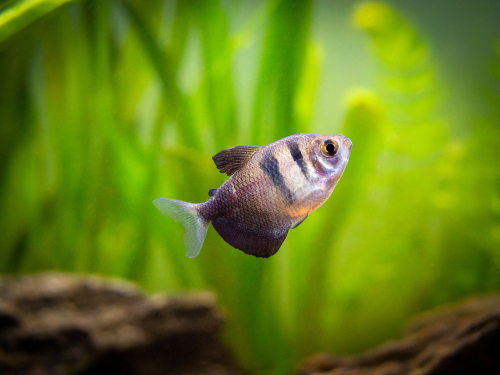These peaceful, monochromatic fish have a subtle appeal that can add active swimming movements to the middle and top water columns in your aquarium. Tetras not only enjoy an environment that has live plants, but they enjoy staying together in a pack of at least 6 as schooling fish.
You’ll want to get the right black skirt tetra tank mates for these gentle fish to survive and thrive. Therefore, choose from many calm fish species such as Tetras, Danios, Corydoras, Loaches, Barbs, and Gourami that won’t cause any problems for your Black Skirt Tetras.
Discover these top 15 companions to consider for your Black Skirt Tetra community aquarium.
Contents
The Best Black Skirt Tetra Tank Mates
You also shouldn’t miss these other related posts:
- Buenos Aires Tetra Tank Mates
- Sparkling Gourami Tank Mates
- Cherry Barb Tank Mates
- Snowflake Eel Tank Mates
1. Celestial Pearl Danio
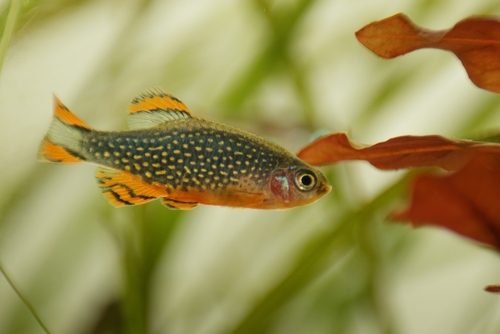
- Scientific name: Danio margaritatus
- Origin: Myanmar
- Size: 1 inch or less
- Care: Moderate or intermediate
These sensitive fish are perfect mates for docile Black Skirt Tetras. They are an incredibly beautiful species that has pearlescent white spots on deep, Galaxy-blue bodies, and rippling red or orange fins and tails.
Celestial Pearls are susceptible to stress if their specific needs aren’t met or they don’t have a large enough social group of other Danios. They also enjoy ultra-clear water, clean aquatic conditions, and lots of rich underwater vegetation. It’s important to give them balanced foods such as flakes and pellets.
Pros of keeping with black skirt tetra
- Gentle and hardy
Cons of keeping with black skirt tetra
- They may bite other fish with long fins unless you have enough fish for a school
2. Molly Fish
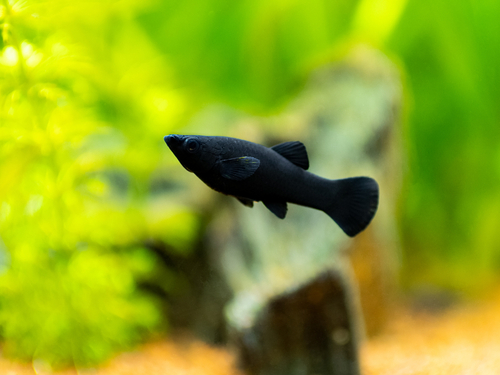
- Scientific name: Poecilia sphenops
- Origin: Columbia and Mexico
- Size: 2 inches
- Care: Easy
Depending on the exact variety, Molly fish have different interesting patterns that include jet black, black and white marbled, yellow, or flaming shades. Mollies are a great addition to any community container.
They enjoy lots of vegetables and commercial fish flakes. A good reason to consider this placid fish for a common aquarium is its powerful ability to clean algae from glass and rocks. On the downside, they can poop a lot, which means that you’ll need to clean the tank more often to accommodate Black Skirt Tetras who need very clean water.
Pros of keeping with black skirt tetra
- Peaceful and good starter fish
Cons of keeping with black skirt tetra
- They tend to get flukes, Ich, and parasitic and bacterial infections
3. Neon Tetra
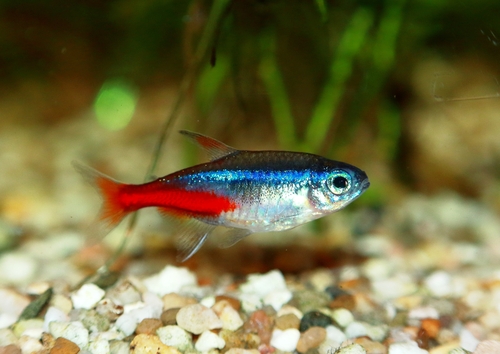
- Scientific name: Paracheirodon innesi
- Origin: Brazil and Peru
- Size: About an inches
- Care: Easy
These shiny red and blue fish can add a dash of tropical color to an otherwise monochromatic Black Skirt Tetra tank. This species is perfect for people who haven’t kept fish before. They enjoy protein and veggies crumbled up small enough for them to consume.
You can make your Neon Tetras happy by keeping them in a schooling group of about 15 fish. While it’s a good idea to add rocks, floating plants and other vegetation to create hiding spaces, you’ll also need to leave enough room for this schooling fish to swim around the tank.
Pros of keeping with black skirt tetra
- Aren’t picky eaters and live a long time
Cons of keeping with black skirt tetra
- Sensitive to light and prone to stress
4. Dwarf Gourami
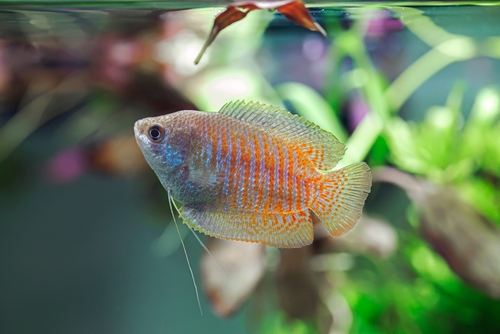
- Scientific name: Trichogaster Ialius
- Origin: India
- Size: a couple of inches
- Care: Easy
Whether you choose a rainbow, neon-colored, powder blue, honeycomb gold, or flaming orange-red Gourami, these small fish get along well with Black Tetra Tank mates who swim in the same middle and upper tank areas.
They’re a calm species that doesn’t care if they eat vegetable flakes or brine shrimp. Just make sure to change the water often and maintain the proper room temperature to ensure optimal labyrinth organ health.
Pros of keeping with black skirt tetra
- Omnivorous and non-picky diets
Cons of keeping with black skirt tetra
- Need specific water conditions
5. Horsehead Loach
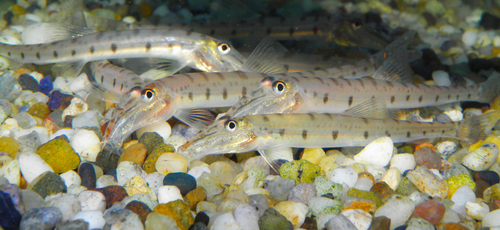
- Scientific name: Acantopsis dialuzona
- Origin: Borneo, Sumatra, and Thailand
- Size: 10 inches
- Care: Easy
There’s no denying that these placid fish add a touch of whimsy to any tank. Horsehead Loaches are semi-transparent fish with regular brown marks or segments along their long, slender bodies. Their big eyes and horsey faces are why they get their obvious name.
While these fish can grow up to almost a foot long, these loaches are low, shy, and peaceful bottom feeders that prefer to bury themselves deep in the substrate until just their eyes show. You’re likely to see more action if the tank is kept dark with lots of vegetation and low room lighting when you drop food that sinks to the bottom at night.
Pros of keeping with black skirt tetra
- Shy and gentle
Cons of keeping with black skirt tetra
- They aren’t very active
6. Harlequin Rasbora
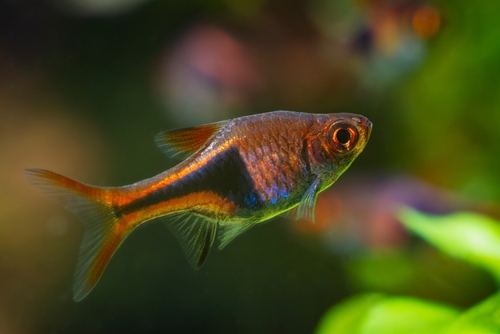
- Scientific name: Rasbora heteromorpha
- Origin: Malaysia, Singapore, and Sumatra
- Size: About an inch or two
- Care: Easy
Sleek golden and crimson bodies highlighted by a black pattern at the base of the tail characterize these small and hardy tank mates.
It’s recommended to fill the tank with lots of standing vegetation but to avoid floating plants that can block their passage to the surface of the water. Since Rasboras use oxygen, it’s vital that they can reach the top to breathe. They’re content with a simple diet of brine shrimp, pellets, and worms.
Pros of keeping with black skirt tetra
- They aren’t prone to health problems and can acclimate to various water parameters
Cons of keeping with black skirt tetra
- May fall prey to bigger or more aggressive fish
7. Bolivian Ram Cichlid
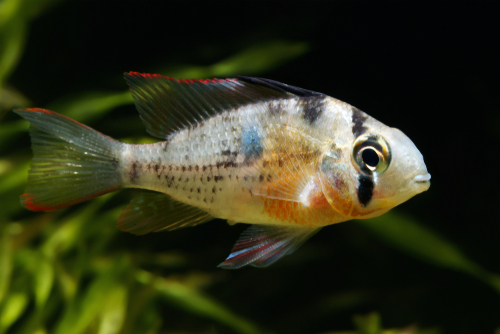
- Scientific name: Mikrogeophagus altispinosu
- Origin: Bolivia and Brazil
- Size: 5 inches
- Care: Easy
With their pale yellow, semi-translucent oblong bodies decorated with a black band near the head, long fins tipped with red, and pale lips, the Bolivian Ram Cichlid is a generally non-aggressive fish that is content to leave other species alone.
Although every species on this list pairs well with Black Skirt Tetras, Cichlids may not always get along with every single kind of docile species. That’s why it’s important to check that all the fish that you add to a community tank will get along. Unlike other cichlids, these are placid fish that shouldn’t cause any problems.
Bolivian Rams are beginner-friendly and omnivorous and require a sandy substrate with lots of big pebbles.
Pros of keeping with black skirt tetra
- Not picky eaters
Cons of keeping with black skirt tetra
- May not interact well with other cichlids
8. Corydoras Catfish
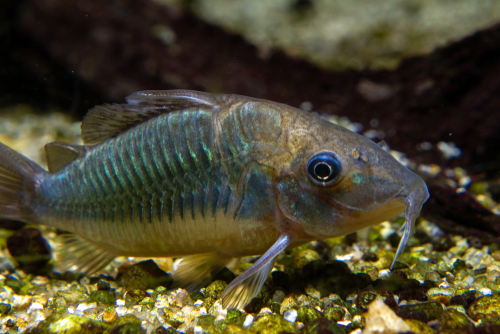
- Scientific name: Brochis splendens
- Origin: Peru
- Size: several inches
- Care: Easy
These little bottom-dwellers won’t bother your upper tank-dwelling Black Skirt Tetras. Instead, they prefer to stay close to the substrate.
Since Corydoras thrive in shoals, it’s important to keep about 6 together. This will help your Cories stay happier and create more active swimming patterns.
Corydoras are a good, practical choice for ensuring that your tank is kept free from algae. You’ll also need to give them brine shrimp, worms, and some vegetable flakes since they can’t live on algae alone.
Pros of keeping with black skirt tetra
- Easy care and long-lived
Cons of keeping with black skirt tetra
- Needs a specific water temperature range
9. Kuhli Loach
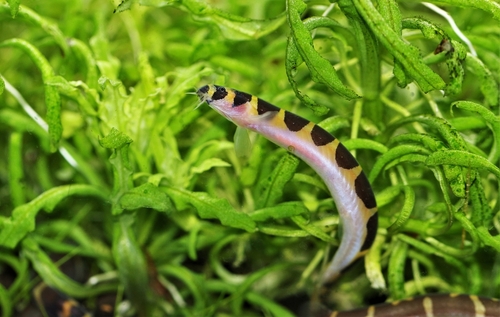
- Scientific name: Pangio kuhlii
- Origin: Java
- Size: Around 3 or 4 inches
- Care: Intermediate
If you have some experience as an aquarist, consider adding a few Kuhli Loaches to your community tank. While Black Skirt Tetras prefer the upper water column, Kuhli Loaches are going to spend most of their time tucked into caves, rocks, or décor in the tank substrate.
This species has elongated, pale yellow bodies with dark bands or speckles, and can look flexible as eels.
They usually like to zip around the tank and eat after dark, so it’s important to drop sinking pellets, bloodworms, or black worms that have been frozen into their tank before you go to bed.
Pros of keeping with black skirt tetra
- Great aquarium cleaners
Cons of keeping with black skirt tetra
- Can have multiple health problems such as infections
10. Cherry Barb
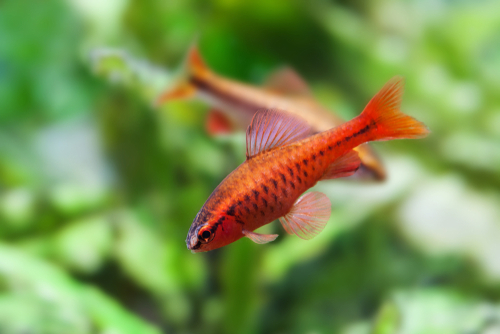
- Scientific name: Puntius titteya
- Origin: Mexico and Columbia
- Size: 3 inches
- Care: Easy
Despite their name, these tank mates are easygoing fish that swim slower and don’t bite like their more aggressive barb relatives. Since they live in groups, these fish have scarlet-colored scales and fins that are fantastic to watch in action.
Barbs can adapt to a lot of different water conditions. As little aquatic omnivores, they can eat anything from worms to algae if they get enough balanced nutrients.
Pros of keeping with black skirt tetra
- Can live in smaller-size tanks
Cons of keeping with black skirt tetra
- Tend to get bacterial and parasite infections and stress-related conditions such as fin rot
11. Platy Fish
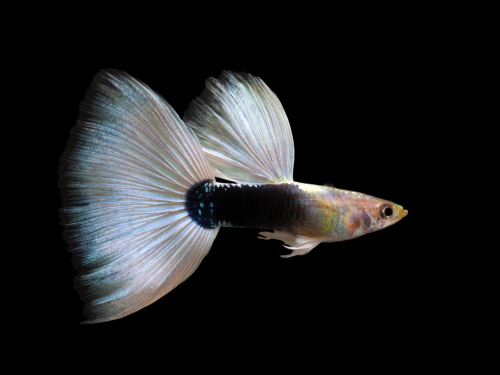
- Scientific name: Poecilia
- Origin: Mexico to Belize
- Size: 4 inches
- Care: Easy
The humble Platy is a lovely orange or yellow fish with crimson strips across its cheeks, and random black spots that spread out to a black tail. There are lots of different Platy colors and patterns, so it’s a fun way to customize your community tank to look how you want.
Whether you’re a beginner or just want a low-maintenance species, Platy can eat frozen brine shrimp, worms, or flakes.
Pros of keeping with black skirt tetra
- Easy to feed
Cons of keeping with black skirt tetra
- May not live long
12. Pygmy Corydoras
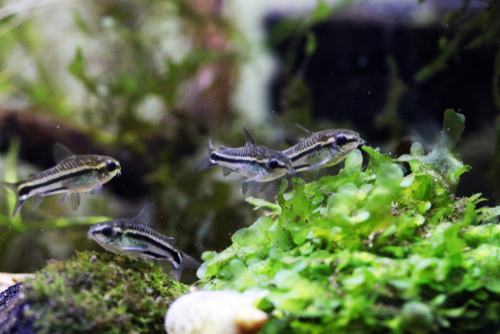
- Scientific name: Corydoras pygmaeus
- Origin: Brazil
- Size: 1 inch
- Care: Moderate
These tiny, silver-blue fish have a central horizontal stripe that runs through their bodies. Since they stay on the tank bottom, they won’t bother your Black Skirted Tetras living in the middle and top of the aquarium.
Try to get a dozen Corydoras to engage their social side since they are a schooling species. While they can eat a variety of worms, pellets, and shrimp, just make sure that you break these pieces up into crumb-sized bits so your fish can swallow them.
Pros of keeping with black skirt tetra
- Good tank cleaners who don’t take up much space
Cons of keeping with black skirt tetra
- Might uproot aquatic plants or dig up tank floor
13. Honey Gourami
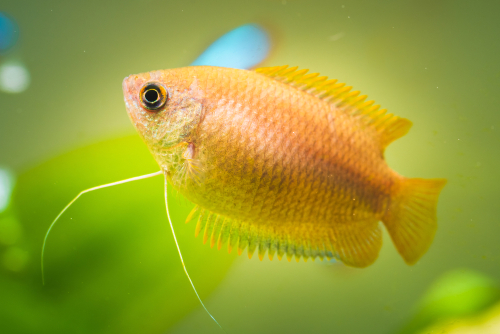
- Scientific name: Trichogaster chuna
- Origin: India, Columbia, and Brazil
- Size: 1 or 2 inches
- Care: Easy
Honey Gourami are peaceful aquatic pets that enjoy filtered lighting and lots of hiding places. They aren’t the kind of fish that will cause any friction with Black Skirt Tetras. From gold to red, orange, or brownish-green shades, Honey Gourami are distinctive fish with a flair.
They like to eat algae, worms, and larvae when housed in a community tank.
Pros of keeping with black skirt tetra
- Fun and easy to care for
Cons of keeping with black skirt tetra
- Needs lots of vegetation that may interfere with other species’ ability to reach the water’s surface
14. Cardinal Tetra
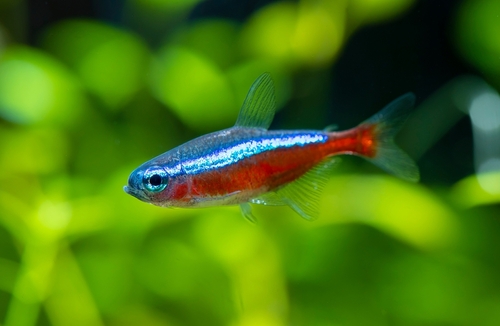
- Scientific name: Paracheirodon axelrodi
- Origin: Columbia and Venezuela
- Size: Average of an inch or two
- Care: Intermediate
This vivid tank mate has a neon red body with a bright blue stripe bisecting its body from head to tail. These colors are usually seen when a tank has softly acidic water conditions.
Keep lights subdued and plenty of swimming space stocked with some floating plants and hiding spots. While they are omnivorous, they need feeding at least 2 to 3 times a day from frozen shrimp and flake foods chopped into tiny pieces.
Pros of keeping with black skirt tetra
- Active and friendly community tank members
Cons of keeping with black skirt tetra
- Less hardy and more prone to disease
15. Pearl Gourami
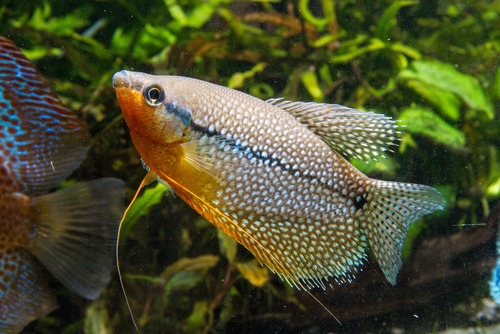
- Scientific name: Trichopodus leerii
- Origin: Indonesia
- Size: 3 inches
- Care: Easy
While these fish inhabit the middle part of the tank, they are also mellow fish that won’t bother your Black Skirt Tetras. Since both species are calm and peaceful, they make excellent tank mates.
The good news is that Pearl Gouramis are also compatible with tiny fish like guppies or tetras. They won’t terrorize or eat them. At the same time, we recommend getting more female Pearl Gourami and just a single male to avoid rivalry among the same species.
Pearl Gouramis are omnivores, but they need a well-balanced diet that includes glass worms, black worms, and cooked peas and spinach for optimal health benefits.
Pros of keeping with black skirt tetra
- Easy going temperament
Cons of keeping with black skirt tetra
- May have lots of infections
The Bottom Line
There are a few things to consider when you add fish friends to any tank. Some fish such as Rasboras can adapt well to shifting water temperatures and conditions. In contrast, Black Skirt Tetras will need pristine clean water and careful temperatures.
Some fish may need more precise parameters than others, so it’s important to make sure that more sensitive fish have their needs met. Get a big enough tank to avoid overcrowding, health issues, and friction in a communal tank that is too small.
Consider choosing several kinds of non-aggressive fish that spend most of their time in different parts of the tank to clear the water of any food competition or territorial issues.

Ian Sterling, founder of Fishlab.com, began his aquarium journey over 30 years ago, driven by a deep fascination for fish and their diverse personalities. His website, Fishlab.com, is dedicated to making fishkeeping accessible and enjoyable, offering beginner-friendly guidance, expert insights, and a community for aquarists to connect and share experiences.


